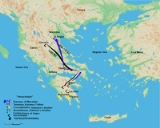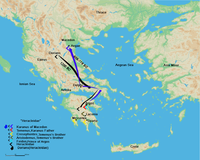
Aristodemus
Encyclopedia
In Greek mythology
, Aristodemus (Ancient Greek
: Ἀριστόδημος) was an Heracleidae
, son of Aristomachus and brother of Cresphontes
and Temenus
. He was a great-great-grandson of Heracles
and helped lead the fifth and final attack on Mycenae
in the Peloponnesus.
 Aristodemus and his brothers complained to the Oracle that its instructions had proved fatal to those who had followed them (the Oracle
Aristodemus and his brothers complained to the Oracle that its instructions had proved fatal to those who had followed them (the Oracle
had told Hyllas to attack through the narrow passage when the third fruit was ripe). They received the answer that by the "third fruit" the "third generation" was meant, and that the "narrow passage" was not the isthmus of Corinth, but the straits of Rhium. They accordingly built a fleet at Naupactus
, but before they set sail, Aristodemus was struck by lightning (or shot by Apollo) and the fleet destroyed, because one of the Heraclidae had slain an Acarnania
n soothsayer.
His brothers were later able to conquer the Peloponessus (see Heracleidae
).
By his wife Argia
, daughter of King Autesion
of Thebes
, he was the father of twin Kings Eurysthenes
and Procles
, the ancestors of the two royal houses of Sparta
.
Greek mythology
Greek mythology is the body of myths and legends belonging to the ancient Greeks, concerning their gods and heroes, the nature of the world, and the origins and significance of their own cult and ritual practices. They were a part of religion in ancient Greece...
, Aristodemus (Ancient Greek
Ancient Greek
Ancient Greek is the stage of the Greek language in the periods spanning the times c. 9th–6th centuries BC, , c. 5th–4th centuries BC , and the c. 3rd century BC – 6th century AD of ancient Greece and the ancient world; being predated in the 2nd millennium BC by Mycenaean Greek...
: Ἀριστόδημος) was an Heracleidae
Heracleidae
In Greek mythology, the Heracleidae or Heraclids were the numerous descendants of Heracles , especially applied in a narrower sense to the descendants of Hyllus, the eldest of his four sons by Deianira Other Heracleidae included Macaria, Lamos, Manto, Bianor, Tlepolemus, and Telephus...
, son of Aristomachus and brother of Cresphontes
Cresphontes
In Greek mythology, Cresphontes was a son of Aristomachus, husband of Merope, and brother of Temenus and Aristodemus. He was a great-great-grandson of Heracles and helped lead the fifth and final attack on Mycenae in the Peloponnesus...
and Temenus
Temenus
In Greek mythology, Temenus was a son of Aristomachus and brother of Cresphontes and Aristodemus. He was a great-great-grandson of Heracles and helped lead the fifth and final attack on Mycenae in the Peloponnese. He became King of Argos. He was the father of Ceisus, Káranos, Phalces, Agraeus,...
. He was a great-great-grandson of Heracles
Heracles
Heracles ,born Alcaeus or Alcides , was a divine hero in Greek mythology, the son of Zeus and Alcmene, foster son of Amphitryon and great-grandson of Perseus...
and helped lead the fifth and final attack on Mycenae
Mycenae
Mycenae is an archaeological site in Greece, located about 90 km south-west of Athens, in the north-eastern Peloponnese. Argos is 11 km to the south; Corinth, 48 km to the north...
in the Peloponnesus.

Oracle
In Classical Antiquity, an oracle was a person or agency considered to be a source of wise counsel or prophetic predictions or precognition of the future, inspired by the gods. As such it is a form of divination....
had told Hyllas to attack through the narrow passage when the third fruit was ripe). They received the answer that by the "third fruit" the "third generation" was meant, and that the "narrow passage" was not the isthmus of Corinth, but the straits of Rhium. They accordingly built a fleet at Naupactus
Naupactus
Naupactus or Nafpaktos , is a town and a former municipality in Aetolia-Acarnania, West Greece, Greece. Since the 2011 local government reform it is part of the municipality Nafpaktia, of which it is the seat and a municipal unit...
, but before they set sail, Aristodemus was struck by lightning (or shot by Apollo) and the fleet destroyed, because one of the Heraclidae had slain an Acarnania
Acarnania
Acarnania is a region of west-central Greece that lies along the Ionian Sea, west of Aetolia, with the Achelous River for a boundary, and north of the gulf of Calydon, which is the entrance to the Gulf of Corinth. Today it forms the western part of the prefecture of Aetolia-Acarnania. The capital...
n soothsayer.
His brothers were later able to conquer the Peloponessus (see Heracleidae
Heracleidae
In Greek mythology, the Heracleidae or Heraclids were the numerous descendants of Heracles , especially applied in a narrower sense to the descendants of Hyllus, the eldest of his four sons by Deianira Other Heracleidae included Macaria, Lamos, Manto, Bianor, Tlepolemus, and Telephus...
).
By his wife Argia
Argia (mythology)
Argia or Argeia is a name borne by four minor characters in Greek mythology. These are:* Argia, one of the Oceanids. She was the mother of Phoroneus by her brother Inachus. She may also have been the mother of Io....
, daughter of King Autesion
Autesion
In Greek mythology, Autesion – the son of Tisamenus, the grandson of Thersander and Demonassa and the great-grandson of Polynices and Argea – was a king of Thebes....
of Thebes
Ancient Thebes (Boeotia)
See Thebes, Greece for the modern city built on the ancient ruins.Ancient Thebes was a Boeotian city-state , situated to the north of the Cithaeron range, which divides Boeotia from Attica, and on the southern edge of the Boeotian plain...
, he was the father of twin Kings Eurysthenes
Eurysthenes
In Greek legend, Eurysthenes was one of the Heracleidae, a great-great-great-grandson of Heracles, and a son of Aristodemus and Argia. His twin was Procles. Together they received the land of Lacedaemon after Cresphontes, Temenus and Aristodemus defeated Tisamenus, the last Achaean king of the...
and Procles
Procles
In Greek legend, Procles was one of the Heracleidae, a great-great-great-grandson of Heracles, and a son of Aristodemus and Argia. His twin was Eurysthenes. Together they received the land of Lacedaemon after Cresphontes, Temenus and Aristodemus defeated Tisamenus, the last Achaean king of the...
, the ancestors of the two royal houses of Sparta
Sparta
Sparta or Lacedaemon, was a prominent city-state in ancient Greece, situated on the banks of the River Eurotas in Laconia, in south-eastern Peloponnese. It emerged as a political entity around the 10th century BC, when the invading Dorians subjugated the local, non-Dorian population. From c...
.
Sources
- ApollodorusApollodorusApollodorus of Athens son of Asclepiades, was a Greek scholar and grammarian. He was a pupil of Diogenes of Babylon, Panaetius the Stoic, and the grammarian Aristarchus of Samothrace...
, ii. 8. - Diodorus SiculusDiodorus SiculusDiodorus Siculus was a Greek historian who flourished between 60 and 30 BC. According to Diodorus' own work, he was born at Agyrium in Sicily . With one exception, antiquity affords no further information about Diodorus' life and doings beyond what is to be found in his own work, Bibliotheca...
, iv. 57, 58. - PausaniasPausanias (geographer)Pausanias was a Greek traveler and geographer of the 2nd century AD, who lived in the times of Hadrian, Antoninus Pius and Marcus Aurelius. He is famous for his Description of Greece , a lengthy work that describes ancient Greece from firsthand observations, and is a crucial link between classical...
, i. 32, 41, ii. 13, 18, iii. I, iv. 3, v. 3. - EuripidesEuripidesEuripides was one of the three great tragedians of classical Athens, the other two being Aeschylus and Sophocles. Some ancient scholars attributed ninety-five plays to him but according to the Suda it was ninety-two at most...
, Heraclidae. - PindarPindarPindar , was an Ancient Greek lyric poet. Of the canonical nine lyric poets of ancient Greece, his work is the best preserved. Quintilian described him as "by far the greatest of the nine lyric poets, in virtue of his inspired magnificence, the beauty of his thoughts and figures, the rich...
, PythiaPythiaThe Pythia , commonly known as the Oracle of Delphi, was the priestess at the Temple of Apollo at Delphi, located on the slopes of Mount Parnassus. The Pythia was widely credited for her prophecies inspired by Apollo. The Delphic oracle was established in the 8th century BC...
, ix. 137. - HerodotusHerodotusHerodotus was an ancient Greek historian who was born in Halicarnassus, Caria and lived in the 5th century BC . He has been called the "Father of History", and was the first historian known to collect his materials systematically, test their accuracy to a certain extent and arrange them in a...
, ix. 27. - Karl Otfried MüllerKarl Otfried MüllerKarl Otfried Müller , was a German scholar and Philodorian, or admirer of ancient Sparta, who introduced the modern study of Greek mythology.-Biography:...
. Dorians, Part I, Chapter 3. - Connop ThirlwallConnop ThirlwallConnop Thirlwall was an English bishop and historian.-Early life:Thirlwall was born at Stepney, London, of a Northumbrian family. He was a prodigy, learning Latin at three, Greek at four, and writing sermons at seven.He went to Charterhouse School, where George Grote and Julius Hare were among...
. History of Greece, Chapter VII. - George GroteGeorge GroteGeorge Grote was an English classical historian, best known in the field for a major work, the voluminous History of Greece, still read.-Early life:He was born at Clay Hill near Beckenham in Kent...
. History of Greece, Part I, Chapter XVIII. - Georg Busolt. Griechische Geschichte, Part I, Chapter 11, Section 7, where a list of authorities is given.

